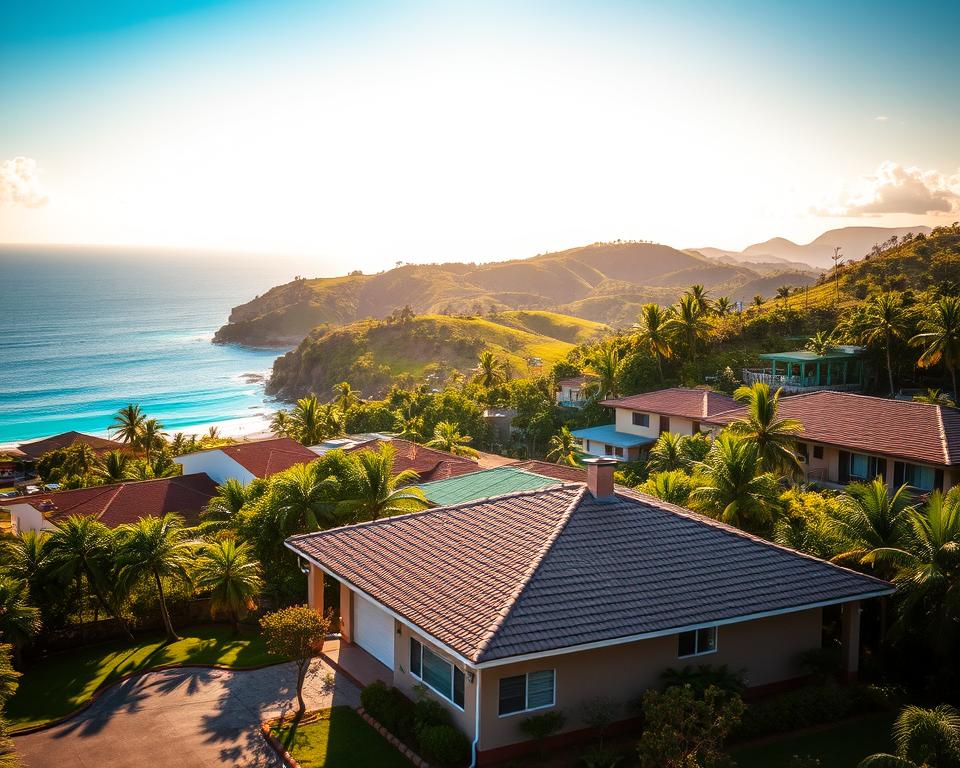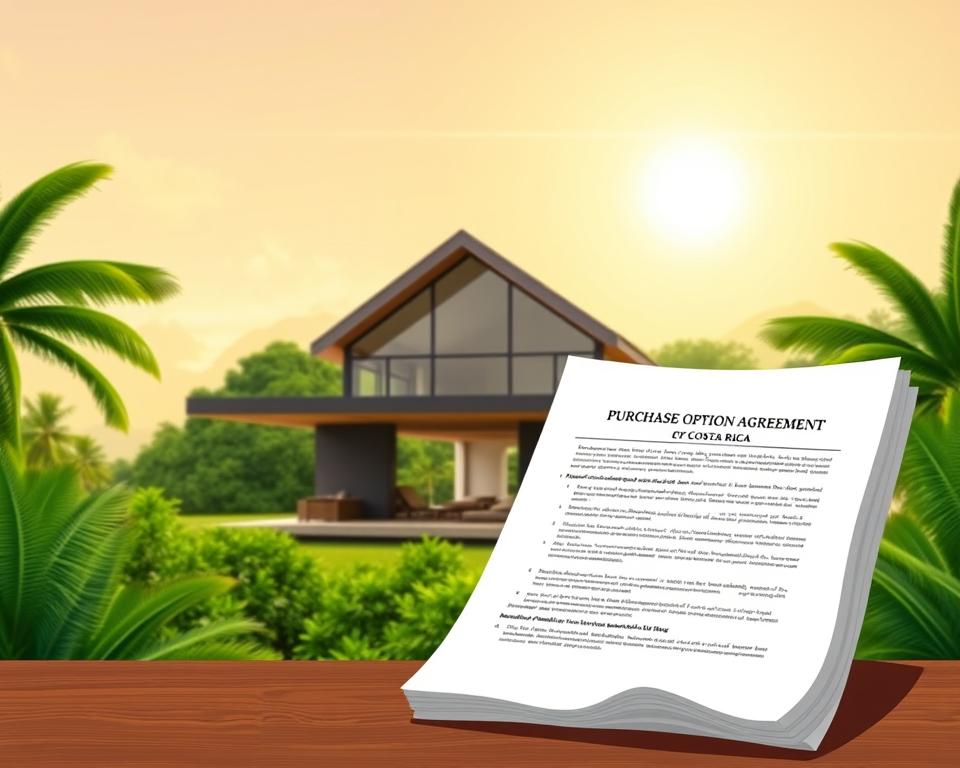We Simplify Selling a House with a Mortgage in Costa Rica
At Gap Real Estate, we understand that selling a property in Costa Rica can be a complex process, especially when it involves a mortgage. With over 20 years of expertise in Costa Rican real estate, we have guided numerous clients through the intricacies of property sales.
Our experience has shown us that selling a property in Costa Rica is quite different from doing so in other countries. The local real estate market operates with unique protocols, timelines, and legal requirements that can surprise foreign property owners.
We aim to provide clear, actionable information to simplify the process and help you avoid common pitfalls. Our goal is to ensure a smooth transaction, from preparing your property for sale to handling international money transfers and closing procedures.
Understanding the Costa Rican Real Estate Market
Navigating the Costa Rican real estate market can be complex due to its unique cultural and legal landscape. We must consider the local customs, laws, and business practices to successfully sell a property.

Cultural Differences in Business Practices
In Costa Rica, business practices are deeply rooted in cultural norms. The local approach to time and deadlines is more relaxed compared to North America or Europe. This fluidity means that transactions can take longer than expected. We need to be aware that government offices, banks, and legal entities operate at their own pace, which can extend timelines.
Costa Rican business culture values thoroughness over speed, resulting in multiple reviews and verifications. This thorough approach can sometimes be misinterpreted as delays, but it’s a necessary part of the process.
The Importance of Patience in Costa Rican Transactions
Patience is crucial when dealing with the Costa Rican real estate market. Transactions typically take longer due to the detailed process involved. Understanding that delays are a normal part of the process can help reduce stress. We should build extra time into our transaction plans, especially when dealing with mortgage-related transactions that involve banks.
- The local business culture prioritizes building relationships over rushing through a transaction.
- Rushing or applying pressure can be counterproductive, potentially damaging relationships and slowing the process.
- Embracing the local pace and being prepared for a longer process will lead to a more successful transaction.
By understanding and respecting the Costa Rican way of doing business, we can navigate the real estate market more effectively.
Preparing Your Property for Sale
Before listing your property for sale in Costa Rica, it’s essential to get your paperwork and taxes in order. This preparation is crucial for a smooth transaction, especially when the buyer is obtaining a mortgage.
Ensuring Clear Title and Documentation
To start, ensure that your property’s title is clear of any liens or disputes. This involves verifying that all documentation related to the property is accurate and up to date. We recommend reviewing your property deeds and any other relevant documents to confirm their validity.
Additionally, if your property is owned by a corporation, you’ll need to provide corporate documentation, including articles of incorporation and proof of current corporate tax payments.
Property Tax Certifications and Requirements
As soon as you have an accepted offer, you’ll need to obtain an up-to-date property tax certification (constancia de impuestos) from your local municipality. This certification confirms that all property taxes are current. In Costa Rica, property taxes are paid quarterly, so if you’ve paid for the entire year, you may be eligible for a refund from the buyer for the prorated amount at closing.
Other requirements include providing proof of payment for the luxury home tax (impuesto solidario) if your property value exceeds the threshold. You’ll also need to request a certification of “no outstanding debts” (certificación de no deudas) from your municipality to confirm all municipal services and fees are paid.
The Process of Selling a House with a Mortgage in Costa Rica
Selling a house with a mortgage in Costa Rica involves a unique set of challenges and opportunities. When considering the sale of a mortgaged property, it’s crucial to understand the local real estate market dynamics and the steps involved in the sales process.
Initial Steps in the Sales Process
The initial steps in selling a house with a mortgage in Costa Rica begin with determining the property’s value and understanding the outstanding mortgage balance. We must consider the current market conditions to set a competitive price for the property.
Our real estate agent plays a vital role in this process, helping us prepare the property for sale and guiding us through the necessary documentation. Once the property is listed, potential buyers will begin to show interest, and we will receive offers through our estate agent.

Negotiating with Potential Buyers
When a buyer likes the property, the estate agent makes the offer in writing and sends it to the seller for negotiation or approval. Negotiation in Costa Rica often extends beyond just the sales price to include other aspects such as furniture, appliances, and closing timelines.
- Understanding the current market conditions and comparable property values is essential for effective negotiation.
- Costa Rican buyers may approach negotiations differently than foreign buyers, often starting with lower offers.
- It’s crucial to be clear about what is included in the sale price to avoid misunderstandings.
By being prepared for negotiations and understanding the local market, we can achieve a successful sale of our property in Costa Rica.
Required Documentation for Selling Your Property
When selling a property in Costa Rica, it’s essential to understand the necessary documentation required for a smooth transaction. As sellers, we must ensure that we have all the required documents in order to facilitate a successful transfer of ownership.
Property Registration and Cadastral Plan
To begin the sales process, we need to obtain a certified copy of the property registration and cadastral plan. This document confirms the property’s ownership and provides details about its boundaries and any existing liens or encumbrances. We should also verify that the property’s registration is up to date and accurate.
Additionally, if there have been any changes or improvements made to the property, we must ensure that these are reflected in the registration and cadastral plan. This may involve updating the property’s records or obtaining new certifications.

Tax Certifications and Municipal Clearances
At closing, we must provide proof that we are current with our property tax payments and municipal assessments. To achieve this, we need to obtain a property tax clearance certificate from our local municipality, showing that all property taxes are paid in full. We should also request a certification of “no municipal debts” to confirm that all municipal services, such as garbage collection and street cleaning, are paid up to date.
- Obtain a property tax clearance certificate from your local municipality.
- Request a certification of “no municipal debts” for municipal services.
- If the property is in a condominium or planned community, obtain a letter from the homeowners association confirming all HOA fees are current.
- Be prepared for the 3% property transfer tax (Impuesto de Traspaso), typically shared between buyer and seller.
It’s also crucial to be aware that documentary stamps amounting to approximately 1.1% of the registered property value will be required for the transfer deed. Foreign sellers should verify their tax status with their accountant to understand any potential capital gains implications in both Costa Rica and their home country.
Working with Real Estate Agents in Costa Rica

With the help of a seasoned real estate agent, you can confidently navigate Costa Rica’s property market. Our agents bring deep local knowledge, having spent over 20 years understanding the intricacies of the Costa Rican real estate market.
Benefits of Professional Representation
Professional representation is key to a successful sale. Your agent will provide a comprehensive market analysis to help you set a competitive and realistic asking price for your property. They will also create professional marketing materials, including high-quality photography and detailed property descriptions, to promote your property effectively.
By qualifying potential buyers before showings, your agent ensures that only those with the financial capacity and serious interest in your property are considered. This streamlined process saves time and reduces the risk of complications.
What to Expect from Your Agent
Expect regular communication from your agent throughout the sales process. They will provide updates on showings, feedback, and market conditions, keeping you informed every step of the way. Your agent will also assist with document preparation and coordination with attorneys, banks, and other parties involved in the transaction.
Moreover, a professional agent will be present during property inspections and appraisals to represent your interests and address any concerns that arise. They will help navigate the complexities of the buyer’s mortgage application process, ensuring a smooth transaction.
The Purchase Option Agreement
Navigating the complexities of selling a property with a mortgage in Costa Rica begins with a well-structured purchase option agreement. This document is crucial for outlining the terms and conditions of the sale, protecting both the buyer and the seller.

Key Elements of a Valid Agreement
A valid purchase option agreement in Costa Rica must include several key elements. It should clearly outline the terms of the sale, including the price, payment terms, and any contingencies. The agreement should also specify the responsibilities of both parties, such as the buyer‘s obligation to secure financing and the seller’s obligation to provide clear title.
Ensuring that the agreement is comprehensive and legally binding is essential. This involves having the document reviewed by a legal professional familiar with Costa Rican real estate law.
Timeframes and Contingencies
The standard timeframe for a purchase option agreement involving bank financing in Costa Rica is typically 90 days, though this can be negotiated. Within this period, a clear due diligence process should be conducted, usually within 30 days, allowing the buyer to investigate the property’s legal status and physical condition.
Contingencies such as mortgage approval, property inspections, and title verification should be specified. The agreement should also outline the process for extending timeframes if delays occur and the procedure for cancelling the agreement if contingencies are not met.
By carefully structuring the purchase option agreement and including necessary contingencies, both parties can ensure a smoother transaction.
Handling Earnest Money Deposits
As we navigate the complexities of selling a house with a mortgage in Costa Rica, understanding how to manage earnest money deposits is crucial. Earnest money is a deposit made by the buyer to demonstrate their commitment to purchasing the property.
Using Escrow Services vs. Direct Deposits
When it comes to handling earnest money deposits, sellers have two primary options: using escrow services or accepting direct deposits. Using an escrow service provides an added layer of security, as it ensures that the buyer has the necessary funds and that the origin of the money is verified, reducing the risk of money laundering.
The escrow company will hold the funds until the sale is completed and then disburse them according to the seller’s instructions.
Protecting Your Interests as a Seller
To protect your interests as a seller, it’s essential to structure the earnest money agreement carefully. This includes verifying the buyer’s financial capacity before accepting an offer and ensuring that the purchase agreement clearly states the conditions under which you can retain the earnest money if the buyer defaults.
- Verify the buyer’s financial capacity, including pre-approval letters for mortgage financing.
- Include non-refundable portions in the earnest money agreement to compensate for taking the property off the market.
- Establish clear timelines for due diligence completion and mortgage approval.
Understanding the Buyer’s Mortgage Application Process
Understanding the intricacies of the mortgage application process in Costa Rica is vital for sellers to ensure a successful and timely transaction. The process involves several key steps and requirements that can significantly impact the sale of a property.
Typical Bank Requirements for Mortgage Approval
When a buyer applies for a mortgage, the bank will require various documents and information to process the loan. Once all documents are delivered, the bank may request additional requirements. The bank will send an appraiser to evaluate the property, and this appraisal report will be sent to the loan officer. This step typically takes 1-2 weeks.
The buyer must be pre-qualified for the loan before the approval process can begin. After pre-qualification, the approval process takes about 4 weeks from the moment all documents are presented. It’s crucial for the real estate agent to follow up constantly with the loan officer to keep the documents moving.
Timeline Expectations for Mortgage Processing
The mortgage approval process in Costa Rica typically takes 60-90 days from application to final approval, significantly longer than in many other countries. Here’s a breakdown of the timeline expectations:
- Initial pre-qualification may take 2-3 weeks, followed by a more detailed underwriting process that can extend 4-6 weeks.
- Property appraisals typically take 1-2 weeks to complete and another 1-2 weeks for the report to be processed by the bank.
- Document verification and legal review by the bank’s legal department usually requires 2-3 weeks, assuming no issues are discovered.
- Final loan approval and preparation of closing documents generally takes another 2 weeks after all conditions have been met.
- Scheduling the closing with the bank’s notary can add another 1-2 weeks to the timeline after loan approval.
It’s essential to expect potential delays in this timeline, particularly during holiday periods or if any documentation issues arise during the process.
Property Appraisals and Inspections
As we navigate the complexities of selling a property with a mortgage in Costa Rica, it’s vital to understand the significance of property appraisals and inspections. These processes are crucial in determining the value of the home and identifying any potential issues that could impact the sale.
Preparing for the Bank’s Appraisal
Before the buyer’s loan is approved, the bank will typically require an appraisal of the property to determine its value. As the seller, it’s essential to prepare for this appraisal by ensuring that the property is in good condition and that all necessary documentation is in order. This may include providing information about recent renovations or upgrades to the property.
- Review the appraisal report carefully and address any issues identified that could affect the mortgage approval or property value.
- Ensure all building permits and certificates of occupancy are in order, particularly for recent additions or renovations that may be scrutinized during the appraisal.
Addressing Potential Issues Before Closing
If the appraisal report identifies any issues with the property, it’s crucial to address these before closing the sale. This may involve negotiating with the buyer regarding which repairs are the seller’s responsibility and which are the buyer’s. It’s also essential to keep detailed records and receipts of all repairs completed, as the bank may require proof that issues have been addressed.
- Negotiate with the buyer regarding which repairs are your responsibility and which are theirs, documenting these agreements in writing.
- Be prepared for a follow-up inspection to verify that required repairs have been completed satisfactorily.
Special Considerations for Corporate-Owned Properties
Selling a property owned by a corporation in Costa Rica involves specific legal and procedural requirements that must be carefully navigated to ensure a smooth transaction.
Required Corporate Documentation
When dealing with corporate-owned properties, it’s essential to have the proper documentation in order. This includes ensuring that the corporate representative has the authority to act on behalf of the corporation. The corporation’s general power of attorney must be authorized to sell the property, as per the provisions of Article Thirty-two Ter of the Code of Commerce.
- Ensure the corporation’s documentation is up-to-date and compliant with Costa Rican regulations.
- Verify that the corporate representative has the necessary authority through corporate resolutions.
- Confirm that the power of attorney is properly executed before a notary public.
Powers of Attorney and Legal Representation
If you cannot be physically present for the closing, granting a power of attorney (poder especial) to a trusted representative in Costa Rica is necessary. Powers of attorney must be properly executed and, if done outside Costa Rica, must be apostilled or authenticated by the Costa Rican consulate.
- Consider the different types of powers of attorney available, including special and general powers.
- Ensure the power of attorney clearly specifies the authority granted, including negotiating terms and signing documents.
- Be aware that powers of attorney in Costa Rica typically have expiration dates, so timing is crucial.
Navigating Closing Procedures
Understanding the closing procedures is vital for a smooth transaction when selling a house with a mortgage in Costa Rica. The closing process involves several key stakeholders and various costs.
The Role of the Notary Public
A Notary Public plays a crucial role in the closing process. They are responsible for drafting the contract for sale and ensuring that the transfer deed is properly executed. Notary fees are calculated based on the actual sales price, at 1.5% of the first million Colones and 1.25% on the remainder.
- The Notary Public ensures the legality of the transaction.
- They handle the preparation and execution of the transfer deed.
- Notary fees are a significant part of the closing costs.
Transfer Taxes and Registration Fees
The closing costs in Costa Rica include several taxes and fees. The property transfer tax is 3% of the registered value of the property, typically split between the buyer and seller. Additionally, documentary stamps amount to approximately 1.1% of the registered property value.
- The property transfer tax is usually split equally between the parties.
- Documentary stamps are required for the transfer deed.
- The National Registry charges a registration fee of 0.5% of the registered property value.
It’s essential to be aware of the two-tiered value system in Costa Rica, where the registered value may differ from the actual sales price. Additional fees may apply if the property has an existing mortgage that needs to be cancelled.
Managing International Money Transfers
As you navigate the process of selling your house with a mortgage in Costa Rica, understanding how to manage international money transfers is essential. The real estate agent plays a crucial role in organizing the cash flow for payments between the buyer, the bank, the escrow service where the earnest money is held, and the seller to facilitate the receipt of the cashier’s check or wire transfer.
Banking Requirements and Anti-Money Laundering Checks
Banks in Costa Rica have stringent requirements for international money transfers, including anti-money laundering checks. To avoid delays, it’s essential to work with your bank well in advance of the closing date. This includes verifying the bank’s specific requirements for international transfers related to real estate transactions and ensuring that all banking information is complete and accurate.
- Provide complete and accurate banking information, including the SWIFT code, IBAN or account number, exact account holder name, and bank address.
- Consider using an escrow service that specializes in international real estate transactions to manage fund transfers securely.
Ensuring Smooth Fund Transfers
To ensure a smooth transaction, it’s crucial to coordinate the timing of fund transfers with the closing date, allowing sufficient time for funds to clear. Additionally, be aware of daily transfer limits and potential exchange rate fluctuations if converting between currencies.
- Coordinate the timing of fund transfers with the closing date, allowing sufficient time for funds to clear while minimizing the time your money is in transit.
- Keep all documentation related to the transfer, including confirmation numbers, receipts, and correspondence.
By understanding the banking requirements and taking steps to ensure smooth fund transfers, you can navigate the complexities of international money transfers when selling your house with a mortgage in Costa Rica.
Common Challenges When Selling Property with a Mortgage
Navigating the sale of a mortgaged property in Costa Rica requires careful planning and expertise. Sellers often face a myriad of challenges, from dealing with delays in the process to overcoming typical obstacles that arise during the transaction.
Understanding these challenges is crucial for a smooth transaction. Working with experienced professionals who are familiar with the Costa Rican real estate system can help anticipate and mitigate potential issues.
Dealing with Delays in the Process
Delays are an unfortunate reality in Costa Rica’s real estate market. To manage these delays, it’s essential to build flexibility into your timeline and financial planning. Maintaining open communication with all parties involved is also crucial, as it ensures everyone remains informed throughout the process.
Consider offering incentives for meeting deadlines, such as slight price reductions if the closing occurs by a certain date. This can motivate all parties to work efficiently towards a successful sale.
Solutions to Typical Obstacles
Preparing for common obstacles is key to a successful transaction. Having backup documentation ready and identifying alternative financing options can help navigate unexpected issues. For foreign sellers, granting a limited power of attorney to a trusted local representative can be beneficial in handling unforeseen problems that may arise.
Developing relationships with key service providers, including banks, attorneys, and government officials, can also help expedite processes when delays occur. By being proactive and having a contingency plan in place, sellers can minimize the impact of these challenges on the sale of their property.
Conclusion: Successfully Completing Your Property Sale
Reaching the closing day for your Costa Rican property sale marks the end of a detailed process, made simpler with professional assistance. At Gap Real Estate, we simplify buying, selling, or investing in Costa Rica. With over two decades of coast-to-coast experience, we deliver seamless transactions through expert guidance, clear communication, and relentless dedication to your goals.
Successfully selling a property with a mortgage in Costa Rica requires patience, preparation, and professional guidance throughout the entire process. The final closing day represents the culmination of months of preparation, negotiation, and documentation, typically taking place at the notary’s office. It’s essential to schedule your closing appointment early in the day, before 3 PM, to ensure you have time to deposit any checks or complete necessary banking transactions on the same day.
Bringing all required original documents to the closing is crucial, including identification, corporate books if applicable, and any other documentation requested by the notary. The closing process involves the notary reading the entire transfer deed aloud, after which all parties sign the document and funds are exchanged. After closing, you’ll receive a testimonio (certified copy) of the transfer deed, serving as proof of the transaction until the deed is fully registered.
With Gap Real Estate’s 20+ years of experience in Costa Rican real estate, we provide the expertise and support needed to navigate the complexities of selling property with a mortgage. Our deep local knowledge and commitment to clear communication help foreign sellers avoid common pitfalls and ensure a smooth transaction from listing to closing. For sellers looking to reinvest in Costa Rican real estate or requiring assistance with international fund transfers, our team offers comprehensive support beyond the closing table.
To discuss how we can assist with your property sale and ensure a successful transaction, contact Gap Real Estate at +(506)-4001-6413 or email us at [email protected]. We’re here to simplify every step, ensuring clarity, confidence, and a stress-free experience. Finally, it’s the big day – Closing Day – and the end of the process of selling a property in Costa Rica. Make the closing appointment before 3 pm, and you’ll still have time to reach your bank to deposit your check. MISSION ACCOMPLISHED!!! CONGRATULATIONS!!!




